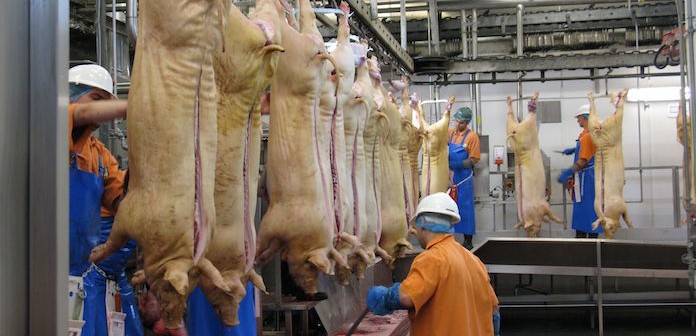The Food Standards Agency (FSA) has thanked meat companies in England for working with it during these ‘unprecedented times’ and has promised to continue working with them to address social distancing concerns.
Addressing some of the concerns that have been raised, in an open letter to the meat industry in England, FSA COVID-19 incident director Dr Colin Sullivan and acting chief operating officer Martin Evans said the co-operation had enabled ‘your meat processing and our meat inspection to continue in businesses up and down the country in the most challenging of circumstances’.
“The importance of the meat sector to the food supply chain has never been more apparent, and the vital role of those working in it has never been more evident,” they said.
“We are hugely grateful for the co-operation from industry and individual businesses we have had in responding to the COVID-19 outbreak and this collaboration will be even more important in the coming weeks and months.”
The FSA’s letter follows recent criticism from the British Meat Processors Association (BMPA). BMPA technical operations director David Lindars told Pig World the agency had been ‘late coming to the party’ and ‘could have engaged at a senior level a lot earlier’.
He called for a ‘more collaborate approach with the FSA’, particularly over the issue of social distancing, an area of concern with the FSA in some plants.
“We are trying to accommodate the social distancing that PHE has put on the website, but it is very difficult in abattoirs and boning and processing plants,” Mr Lindars said. “The guidance states that it should be done ‘as far as is reasonably possible’. It is not possible everywhere, but plants are taking steps to minimise the risks.”
FSA actions
In the FSA open letter, Mr Sullivan and Mr Evans set out the steps that the FSA has taken so far to ‘protect consumer interests and animal welfare whilst supporting businesses to produce safe food’.
This includes ‘early and ongoing engagement with industry’, including ‘leading the ongoing co-ordination and engagement with industry and Defra’ and further engagement across the industry with key players ‘on a daily basis to address emerging issues and ensure a consistent approach across the country’.
The agency has also provided guidance for food businesses on COVID-19 as well as more specific advice for the meat industry.
They outline how the FSA is ready to provide the controls but with significant staff absence. “Working with industry, we have already implemented a number of measures to minimise the impact on businesses. These follow clear principles to ensure they are temporary, are applied as consistently as possible, and will continue to protect food safety and animal welfare,” the FSA officials added.
These measures include:
- Prioritising activity: including deferring scheduled audits for sites with higher audit outcomes (good and generally satisfactory) until the end of June to maximise resources.
- Using existing legislation to support a reduced FSA workforce, including using other qualified individuals to carry out roles and extending some inspection deadlines to maximise resources.
- Identifying authorised FSA staff who are able to return to the front line and staff who can be redirected from other Government agencies, such the Animal and Plant Health Agency.
- Assessing additional measures under temporary legislation: Last week, the European Commission brought out new regulations which will allow the FSA to be more flexible about the way the FSA operates controls.
Social distancing
The letter goes onto address the social distancing concerns, expressing gratitude to ‘those meat businesses that have risen to the significant challenge that social distancing presents at their sites, and who have been looking after the health and safety of the FSA workforce who are there’.
“There is no ‘one size fits all’ solution to this problem and we know each and every site will face different issues in how they implement these measures.
“We continue to work with sites to assist them to deliver these arrangements in the most practical way possible, to allow your staff and our staff to maintain food production and meat inspection at their premises.”
“We would like to thank the industry for the many acts of great co-operation so far in responding to this challenge.”




